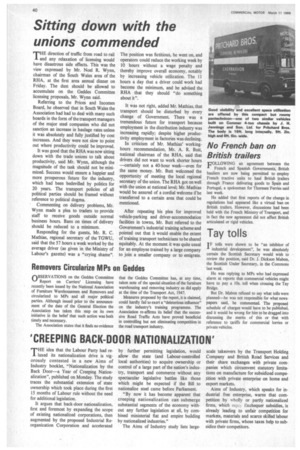Sitting down with the unions commended
Page 42

If you've noticed an error in this article please click here to report it so we can fix it.
THE direction of traffic from road to rail and any relaxation of licensing would have disastrous side effects. This was the view expressed by Mr. Noel R. Wynn, chairman of the South Wales area of the RHA, at the first area annual dinner on Friday. The dust should be allowed to accumulate on the Geddes Committee licensing proposals. Mr. Wynn said.
Referring to the Prices and Incomes Board, he observed that in South Wales the Association had had to deal with many such boards in the form of the transport managers of the major steel companies who did not sanction an increase in haulage rates unless it was absolutely and fully justified by cost increases. And they were not slow to point out where productivity could be improved.
It was good that the RHA was now sitting down with the trade unions to talk about productivity, said Mr. Wynn, although the magnitude of the task should not be minimized. Success would ensure a happier and more prosperous future for the industry, which had been bedevilled by politics for 20 years. The transport policies of all political parties should be framed without reference to political dogma.
Commenting on delivery problems. Mr. Wynn made a plea to traders to provide staff to receive goods outside normal business hours. Bans on times of delivery should be reduced to a minimum.
Responding for the guests. Mr. R. C. Mathias, regional secretary of the TGWU, said that the 57 hours a week worked by the average driver (as given in the Ministry of Labour's gazette) was a "crying shame". The position was fictitious, he went on, and operators could reduce the working week by 10 hours without a wage penalty and thereby improve overall economy, notably by increasing vehicle utilization. The 11 hours a day that a driver could work had become the minimum, and he advised the RHA that they should "do something about it".
It was not right, added Mr. Mathias, that transport should be disturbed by every change of Government. There was a tremendous future for transport because employment in the distribution industry was increasing rapidly: despite higher productivity employment in factories was declining.
In criticism of Mr. Mathias' workinghours recommendation, Mr. A. R. Butt, national chairman of the RHA, said that drivers did not want to work shorter hours —certainly not a 40-hour week—even for the same money. Mr. Butt welcomed the opportunity of meeting the local regional secretary of the union. The RHA got on well with the union at national level; Mr. Mathias would be assured of a cordial welcome if he transferred to a certain area that could be mentioned.
After repeating his plea for improved vehicle-parking and driver-accommodation facilities in towns, Mr. Butt referred to the Government's industrial training scheme and pointed out that it would enable the extent of training transport technicians to be shared equitably. At the moment it was quite usual for an employee trained by a large company to join a smaller company or to emigrate.








































































































































